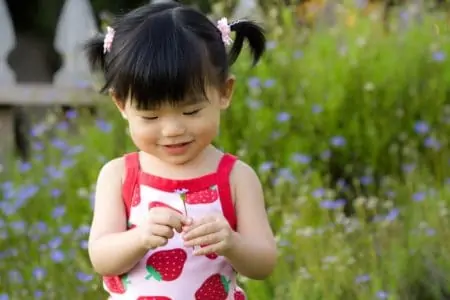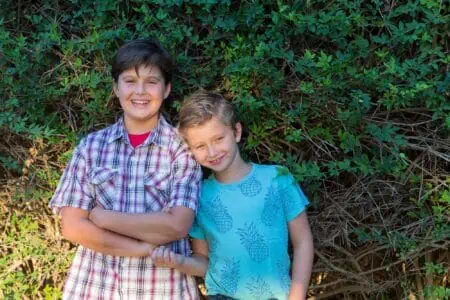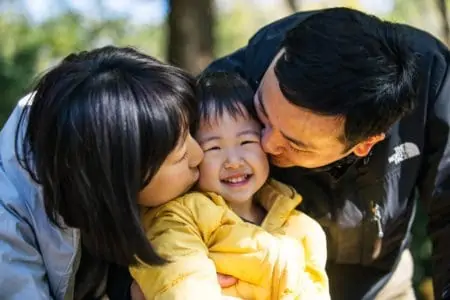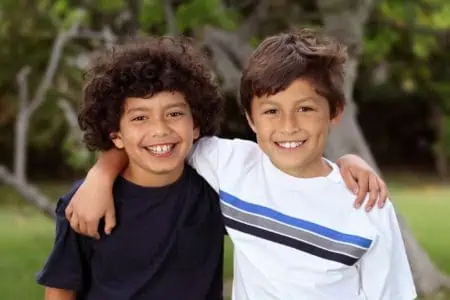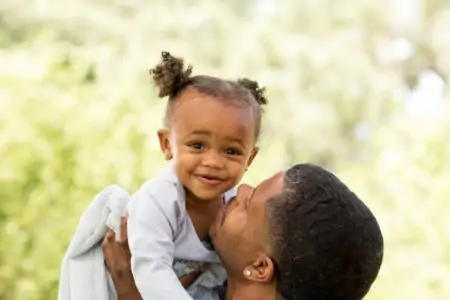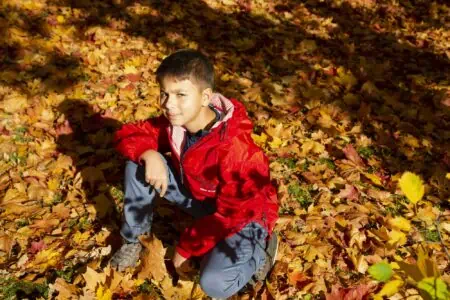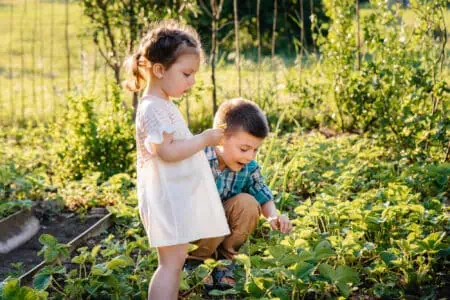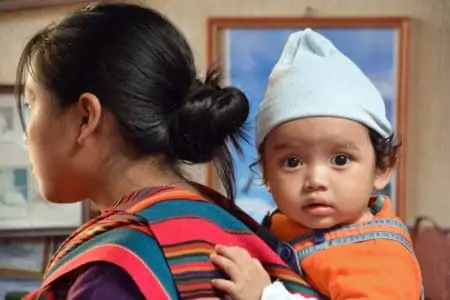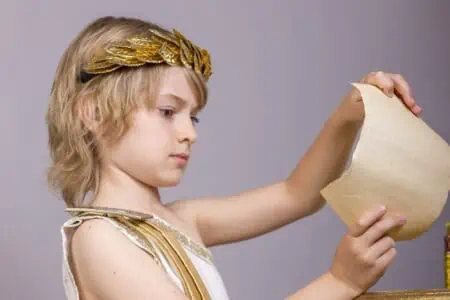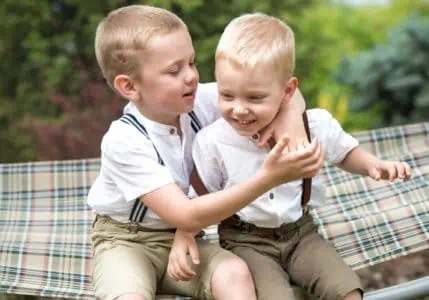Many don’t know much about how Nigerian last names came into being. Combining ancient traditions and modern colonialism makes the names of this alluring West African country challenging to grasp.
Come on a storied journey into understanding all kinds of Nigerian surnames, from every clan, occupation, and locale. Learning about their proper pronunciations and namesakes will make you an expert in no time.
100 Popular Nigerian Surnames
The distinct narrative of Nigerian last names is like no other in the world.
Abara
Abara refers to “a spirit,” but also means “spiritual being” or anyone “great.” It’s one of many Nigerian last names not often seen outside western Africa.
- Origin: Nigerian, Igbo
- Meaning: A spirit
- Pronunciation: AH-baa-rah
- Variations: Abără
- Popularity: Abara is rare worldwide, mostly used in Nigeria, and ranked 585th in Niger in 2014.
Abdullah
Abdullah is associated with Abdullani and the Arabic phrase “abd Allah,” meaning “servant of Allah.” Abdullah is quite popular throughout Arabic, North, and East Africa, and with some Middle Eastern Jews.
- Origin: Nigerian, Arabic
- Meaning: Servant of God
- Pronunciation: Aeb-DUW-Lah
- Variations: Abdallah, Abdellah, Abdulla
- Namesakes: Abdullah Abdullah, the Chief Executive of Afghanistan from 2014 to 2020. Rahim Abdullah, an American football player for the Cleveland Browns.
- Popularity: Abdullah ranked 200th worldwide and is mainly used in Yemen, where it ranked 5th in 2014.
Abimbola
Abimbola is among many Nigerian surnames that’s also a unisex name. It’s usually shortened to Bimbo, meaning “born with wealth” in Yoruba. Yoruba represents one of three cultures in Nigeria, located primarily in the southwest.
- Origin: Nigerian, Yoruba
- Meaning: Born to be rich
- Pronunciation: Ah-BIYM-bow-Laa
- Namesakes: Bola Abimbola, a Nigerian musician known for the album Silifa Bamijo (1987). Wán̄dé Abím̄bọ́lá, the Majority Leader of the Senate of the Federal Republic of Nigeria.
- Popularity: Abimbola is rare worldwide and primarily used in Nigeria, ranking 927th in 2014.
Adebayo
Adebayo’s many Yoruba meanings mean “he came in a joyful time,” “the king meets joy,” and “greatness enjoined with joy.” As a Nigerian boy’s name, it means “he was happy.”
- Origin: Nigerian, Yoruba
- Meaning: Crown meets joy
- Pronunciation: Ah-deh-BAEY-ow
- Variations: Adebayor
- Namesakes: Cornelius Adebayo, a Nigerian governor of the Kwara state in 1983. Sunday Adebayo, a Nigerian basketball player for the Memphis Tigers.
- Popularity: Adebayo ranked 1,305th worldwide and is mostly used in Nigeria, where it ranked 49th in 2014.
Adesina
In Yoruba, Adesina means “the crown or royalty opens the way (forward).” It’s often used as a first name for boys when their arrival is long-awaited.
- Origin: Nigerian, Yoruba
- Meaning: My coming has opened the way
- Pronunciation: Ah-deh-SEEN-ah
- Namesakes: Femi Adesina, a Nigerian journalist and editor-in-chief of The Sun Newspaper. Akinwumi Adesina, the President of the African Development Bank.
- Popularity: Adesina is rare worldwide and mainly used in Nigeria, ranking 85th in 2014.
Akíntó̩lá
Akíntó̩lá is also a Yoruba given name, referring to the benefits of “being brave.” It consists of “tó o̩lá,” meaning “valor is sufficient for honor.”
- Origin: Nigerian
- Meaning: Valor measures up to wealth
- Pronunciation: Ah-KIHN-tow-Laa
- Namesakes: Ládòkè Akíntọ́lá, the Premier of Western Nigeria from 1960 to 1966.
- Popularity: Akíntó̩lá is rare worldwide and primarily used in Nigeria, where it ranked 668th in 2014.
Attah
Attah is an Igbo name meaning “father of everyone” that’s also used in West African Ghana. It comes from an Akan first name, also meaning “twin.”
- Origin: Nigerian, Igbo
- Meaning: Father of everyone
- Pronunciation: AH-taa
- Variations: Atta
- Namesakes: Daniel Attah, a Nigerian boxer who competed at the 1996 Summer Olympics. Aliyu Attah, the 8th Inspector General of Police from 1990 to 1993.
- Popularity: Attah is rare worldwide and mostly used in Nigeria, ranking 459th in 2014.
Baba
Baba comes from the Ngoni tribe as a male title of respect, like “mister.” It’s sometimes short for Babatunde, meaning “master of a household.”
- Origin: Nigerian
- Meaning: Title of respect
- Pronunciation: BAA-bah
- Namesakes: Abdul Ghafar Baba, the 6th Deputy Prime Minister of Malaysia from 1986 to 1993. Yudai Baba, a Japanese basketball player for the Japan men’s national basketball team.
- Popularity: Baba ranked 624th worldwide and is mainly used in Nigeria, where it ranked 53rd in 2014.
Babangida
Babangida means “master of the house” in Hausa. It also means “house ruler,” so it’s similar in some way to using Henry in the English-speaking world.
- Origin: Nigerian
- Meaning: Master of the house
- Pronunciation: Baa-baang-GEE-duh
- Variations: Babagida
- Namesakes: Maryam Babangida, the First Lady of Nigeria from 1985 to 1993. Tijani Babangida, a Nigerian footballer for Vitesse.
- Popularity: Babangida is rare worldwide and primarily used in Nigeria, ranking 253rd in 2014.
Balogun
Balogun is composed of the Youba-Nigerian “oba,” meaning “king,” and “ogun,” meaning “war.” It also means “warlord” or “meet at war.” It originated as a title for the second in command to a king, meaning “father in or at war.”
- Origin: Nigerian, Yoruba
- Meaning: King of war
- Pronunciation: Baa-LOUW-gun
- Variations: Balog, Balogh, Balogus
- Namesakes: Fausat Balogun, a Nigerian actress known for the series Erin Kee Kee (1990). Oluwafemi Balogun, a Nigerian chess player and winner of the 2016 Africa Zone 4.4 Individual Championship.
- Popularity: Balogun is uncommon worldwide and mostly used in Nigeria, where it ranked 97th in 2014.
Bamidele
Bamidele is also a meaningful given name using the short form Dele. It’s one of many Nigerian family names representing the Yoruba people, who made up roughly 15% of the people in 2023.
- Origin: Nigerian, Yoruba
- Meaning: Follow me home
- Pronunciation: Baa-mih-DEH-Liy
- Namesakes: Michael Opeyemi Bamidele, the majority leader of the Nigerian Senate since 2023. Tunde Bamidele, a Nigerian footballer who competed at the 1978 African Cup of Nations.
- Popularity: Bamidele is rare worldwide and mainly used in Nigeria, ranking 293rd in 2014.
Bankole
Bankole is made up of the Yoruba phrase “bá mi kó̩ ‘lé,” meaning “build a house with me.” It may be an occupational surname for a builder since it also means “help us build a home” and “house builder.”
- Origin: Nigerian, Yoruba
- Meaning: Build my house for me
- Pronunciation: Baan-KOW-lay
- Variations: Bankolé
- Namesakes: Dimeji Bankole, the 11th Speaker of the House of Representatives of Nigeria from 2007 to 2011. Kehinde Bankole, a Nigerian actress named Revelation of the Year at the 2009 Best of Nollywood Awards.
- Popularity: Bankole is rare worldwide and primarily used in Nigeria, where it ranked 425th in 2014.
Bassey
Bassey is based on the Nigerian “abasi,” meaning “God.” Because it’s used for human men, it translates to “lesser god” or “small god.” Bassey is also an English name taken from “basse,” meaning “low” and “short.”
- Origin: Nigerian
- Meaning: Small god
- Pronunciation: BAA-siy
- Namesakes: Charles Bassey, a Nigerian basketball player for the San Antonio Spurs. Ebbe Bassey, a Nigerian-American actress known for Ties That Bind (2011).
- Popularity: Bassey is uncommon worldwide and mostly used in Nigeria, ranking 80th in 2014.
Biyi
Biyi means “God has met my needs” or “may God give him success” in Yoruba. It’s also associated with the meanings – “born into” or “like this” in Yoruba.
- Origin: Nigerian, Arabic
- Meaning: God has met my needs
- Pronunciation: BAEY-ahy
- Popularity: Biyi is very rare worldwide and mainly used in Morocco.
Chidubem
Chidubem means “lead me oh God” or the similar “God leads me.” It also means “God guide me” in Igbo.
- Origin: Nigerian, Igbo
- Meaning: God is guiding me
- Pronunciation: CHIH-duw-Bem
- Popularity: Chidubem is very rare worldwide and primarily used in Nigeria.
Chinwendu
Chiwendu also means “God has life” and is considered similar to Chinedu, meaning “God is leading.” As an Igbo personal name, Chinwe is unisex, but it is more common for girls, meaning “God owns.”
- Origin: Nigerian, Igbo
- Meaning: God possesses life
- Pronunciation: CHEEN-wehn-Doo
- Variations: Chinedu
- Popularity: Chinwendu is very rare worldwide and mostly used in Nigeria.
Chris
Though a popular English boy’s name, Chris appears as a surname in African countries like Nigeria and Tanzania. The original name derives from the Greek Christophoros, meaning “Christ-bearer.”
- Origin: Nigerian, English
- Meaning: Christ-bearer
- Pronunciation: KRISS
- Namesakes: Oliver Chris, an English actor appearing in the series The Office. Marilyn Chris, an American actress known for the soap opera One Life to Live.
- Popularity: Chris is rare worldwide, mainly used in Nigeria, and ranked 132nd in Papua New Guinea in 2014.
Chukwu
Chukwu means “the most high,” and “the Almighty,” as a short form for Nigerian given names like Nwachukwu. It’s used for the traditional Igbo deity and for the Christian God, also called Chukwu.
- Origin: Nigerian, Igbo
- Meaning: Almighty
- Pronunciation: CHUOK-waah
- Variations: Chuku
- Namesakes: Andy Chukwu, a Nigerian director known for Karishika (1996). Onyebuchi Chukwu, the Minister of Health from 2010 until 2014.
- Popularity: Chukwu ranked 1,456th worldwide and is primarily used in Nigeria, where it ranked 58th in 2014.
Danjuma
Danjuma is an example of Nigerian last names from the lesser-known Hausa tribe located in Nigeria and Niger. It’s best known as a boy’s name, meaning “son of Friday.”
- Origin: Nigerian, Yoruba
- Meaning: Born on Friday
- Pronunciation: Daen-JHAH-mah
- Namesakes: Christopher Danjuma, the head coach of Nasarawa Amazons in the Nigeria Women’s Premier League.
- Popularity: Danjuma is rare worldwide and mostly used in Nigeria, ranking 125th in 2014.
Dauda
Dauda’s meanings also include “one who feared no one,” which describes a “hero” perfectly. There is a village named Dauda in the Saptari District of Nepal.
- Origin: Nigerian
- Meaning: Hero
- Pronunciation: DAOW-daa
- Variations: Daudâ
- Namesakes: Fatau Dauda, a Ghanaian footballer for Legon Cities FC. Collins Dauda, a member of the Ghana Parliament since 2005.
- Popularity: Dauda ranked 1,203rd worldwide and is mainly used in Nigeria, where it ranked 46th in 2014.
Egbe
Egbe is typically short for Egbeku, a less common form of Yoruba last names, meaning “kite. It’s also linked to the meanings “large bird” and “eagle,” and the town of Egbe Mekun in the Kogi State of Nigeria.
- Origin: Nigerian, Yoruba
- Meaning: Kite
- Pronunciation: EHG-bey
- Variations: Egbeku
- Popularity: Egbe is rare worldwide and primarily used in Nigeria, ranking 559th in 2014.
Esuola
Esuola specifically means “locust of wealth,” made up of “eṣú,” meaning “locust,” and “ọlá,” meaning “wealth.”
- Origin: Nigerian, Yoruba
- Meaning: Wealthy
- Pronunciation: Ehs-UW-laa
- Popularity: Esuola is very rare worldwide and mostly used in Nigeria.
Eze
In Igbo, Ezè is a proper title given to a “king” or “chief” and is also a given name. It was originally a shorter form of names like Ndubueze, meaning “life is king” in eastern Nigeria.
- Origin: Nigerian, Igbo
- Meaning: King
- Pronunciation: EH-zey
- Namesakes: Chelsea Eze, a Nigerian actress known for Silent Scandals (2009). Joy Eze, a Nigerian sprinter and silver medalist at the 2006 Commonwealth Games.
- Popularity: Exe ranked 770th worldwide and is mainly used in Nigeria, where it ranked 35th in 2014.
Fajoluwafemi
Fajoluwafemi is incredibly rare among Igbo last names and has no available popularity statistics. It occasionally appears as Fallou Ngom, but is another way to wish “good wealth” upon loved ones.
- Origin: Nigerian, Igbo
- Meaning: God has brought me wealth
- Pronunciation: Unknown
Fatai
Fatai is the Nigerian equivalent of Fattah, meaning “conqueror” and “victor.” It’s often used along the Arabic Abdul, meaning “loyal and faithful servant of Allah.”
- Origin: Nigerian, Arabic
- Meaning: Conqueror
- Pronunciation: Faa-TAEY
- Variations: Fataî
- Namesakes: Fatai (born Fatai Veamatahau), a Tongan-Australian singer appearing on The Voice.
- Popularity: Fatai is rare worldwide and primarily used in Nigeria, ranking 422nd in 2014.
Gbadamosi
Gbadamosi represents a Nigerian name with a silent “g” and comes from O̩yo̩ state in Western Nigeria. It’s associated with Ghadames, a desert route in Libya near Tunisia and Algeria.
- Origin: Nigerian
- Meaning: One who puts something great together
- Pronunciation: Baa-dah-MOW-siy
- Namesakes: Nureni Gbadamosi, a Nigerian boxer who competed at the 1980 Summer Olympics. Gabriel Gbadamosi, a Nigerian-English editor of the online literary platform WritersMosaic.
- Popularity: Gbadamosi is rare worldwide and mostly used in Nigeria, where it ranked 499th in 2014.
Guh
While common in Nigeria, Guh is traditionally a Hebrew name meaning “gift of God.” It’s also a Chinese surname appearing as Gu, meaning “to look after” or “to take into consideration.”
- Origin: Nigerian, Hebrew
- Meaning: Gift of God
- Popularity: Guh is very rare worldwide and is mainly used in India.
Hassan
Hassan uses the Arabic root “h-s-n” to represent many names, meaning “handsome,” “excellent,” or “favorable.” As Ḥassān, it also means “benefactor.”
- Origin: Nigerian, Arabic
- Meaning: Good
- Pronunciation: Hhaa-SAEN
- Variations: Hasan
- Namesakes: Abdulmumini M. Hassan, a Nigerian senator for Jigawa South West since 2011. Rilwan Olanrewaju Hassan, a Nigerian footballer for Sreenidi Deccan.
- Popularity: Hassan ranked 60th worldwide, is primarily used in Egypt, and ranked 18th in Nigeria in 2014.
Ibrahim
Ibrahim is the Arabic form of the Hebrew Abraham, meaning “father of many.” It’s also the name of the Islamic prophet, who’s the father of Ismail and Ishaq.
- Origin: Nigerian, Arabic
- Meaning: Father of many
- Pronunciation: Ih-braa-HHIYM
- Variations: Ibraheem, Ibrahimi
- Namesakes: Fauziah Ibrahim, a Singaporean-Australian news presenter for the Australian Broadcasting Corporation. Kamal Ibrahim, an Egyptian wrestler who competed at the 1984 Summer Olympics.
- Popularity: Ibrahim ranked 65th worldwide and is mostly used in Nigeria, ranking number one in 2014.
Ibukun
Ibukun also means “good wishes,” along with a “blessing” as a boy’s name. Its nickname for boys is Ibk.
- Origin: Nigerian, Yoruba
- Meaning: Blessing
- Pronunciation: Ih-BUW-kuhn
- Popularity: Ibukun is very rare worldwide and mainly used in Nigeria.
Ifeanyi
Ifeanyi is an Igbo name based in southeastern Nigeria and is a short form for Ifeanyichukwu. It sometimes means “we can do anything,” while 99% of those named Ideanyi are found in Africa.
- Origin: Nigerian, Igbo
- Meaning: Nothing is impossible with God
- Pronunciation: If-AAN-iy
- Namesakes: Israel Ifeanyi, an American football player for the San Francisco 49ers. Edwin Ifeanyi, a Cameroonian footballer for Tokyo Gas.
- Popularity: Ifeanyi is rare worldwide and primarily used in Nigeria, where it ranked 544th in 2014.
Igbinedion
Igbinedion has a very specific meaning of “seeking refuge in the elder’s protection.” It’s typically found in the Benin tribes of Nigeria.
- Origin: Nigerian
- Meaning: Seeking refuge in the elders’s protection
- Pronunciation: Ihg-binn-EH-diy-Ahn
- Namesakes: Gabriel Igbinedion, the chief Esama of the Benin Kingdom in Nigeria.
- Popularity: Igbinedion is rare worldwide and primarily used in Nigeria.
Igwe
Igwe is the name of the traditional Igbo “god of the sky.” It’s also short for first names like Igwebuike, meaning “many are powerful,” and is a royal title used for Igbo rulers in Nigeria.
- Origin: Nigerian
- Meaning: Sky father
- Pronunciation: IHG-whey
- Variations: Igwé
- Namesakes: Ekene Igwe-Onu, a Nigerian footballer for the Enugu Rangers. Leo Igwe, a Nigerian human rights advocate and a laureate of the International Academy of Humanism in 2014.
- Popularity: Igwe ranked 1,493rd worldwide and is mainly used in Nigeria, ranking 59th in 2014.
Ihejirika
Ihejirika is considered an Igbo personal name, meaning “I have the greater one.” It works better as a surname since its meaning isn’t super thoughtful on its own.
- Origin: Nigerian, Igbo
- Meaning: The one that I have is greater
- Pronunciation: Ih-hehj-DRIYK-ah
- Popularity: Ihejirika is rare worldwide and primarily used in Nigeria, where it ranked 1,125th in 2014.
Isioma
Isioma refers to a “fortunate person” or a “blessed” one. It’s composed of the Igbo “isi,” meaning “head” (referring to destiny) and “oma,” meaning “good.” The end result is a person with a “good destiny” or a “good head on their shoulders.”
- Origin: Nigerian, Igbo
- Meaning: Good luck
- Pronunciation: Ih-siy-OW-maa
- Popularity: Isioma is very rare worldwide and mostly used in Nigeria.
Jacob
Jacob is the English spelling of the Hebrew Yaʿaqov, yet it also appears in Nigeria as Yakubu. Jacob traditionally refers to the name of an ancestor as “the son of Jacob.”
- Origin: Nigerian, Hebrew
- Meaning: Supplanter
- Pronunciation: JAY-kuhb
- Variations: Jacobs
- Namesakes: Mick Jacob, an Irish hurler for Wexford. Suzanne Jacob, a French-Canadian writer who founded the publishing house Le Biocreux.
- Popularity: Jacob ranked 1,003rd worldwide and is mainly used in Nigeria, ranking 161st in 2014.
Jesu
Jesus is associated with alternative forms of Jesus, like Isa and Yeshua. It’s linked to the Shona language in Zimbabwe, while Jesu has appeared for Jesus in several hymns and religious texts.
- Origin: Nigerian
- Meaning: Jesus
- Pronunciation: JEH-suw
- Variations: Jesus
- Popularity: Jesu is very rare worldwide and primarily used in Sri Lanka.
Jideonwo
Jideonwo is among Nigerian surnames without specific ethnicities. It simply means “crown coming from heaven,” which makes it religious in an abstract fashion.
- Origin: Nigerian
- Meaning: Crown coming from heaven
- Pronunciation: JIY-dee-Ohn-woh
- Namesakes: Chude Jideonwo, a Nigerian TV host and founder of Joy, Inc.
- Popularity: Jideonwo is very rare worldwide and mostly used in Nigeria.
Jimo
Jimo is also a boy’s name meaning “awake child” in Yoruba. It’s made up of “jí,” meaning “wake up” and “arise,” along with “ọmọ,” meaning “child.” Jimo is also a diminutive of names like Ajírọ́mọgbé and is the name of a district in Shandong, China.
- Origin: Nigerian, Yoruba
- Meaning: Wake up
- Pronunciation: JIY-mow
- Popularity: Jimo is rare worldwide and mainly used in Nigeria, where it’s slightly uncommon.
Kalu
Kalu is known as the Igbo god of thunder and lightning and a short form of Kamanu or Kamalu. It’s also linked to a caste in Nepal for the Shrestha community.
- Origin: Nigerian, Igbo
- Meaning: God of thunder
- Pronunciation: KAA-luw
- Variations: Kanu
- Namesakes: Nnamdi Kanu, a British-Nigerian leader of the Indigenous People of Biafra (IPOB). Joshua Kalu, an American football player for the Washington Commanders.
- Popularity: Kalu is uncommon worldwide and primarily used in Nigeria, ranking 119th in 2014.
Kannayya
Kannayya specifically means “a gift from the god Shiva” and sometimes refers to a “father by blood.” It’s associated with an Indian ritual of passing a baby through a wall for protection from a deity. Kannayya is also a Japanese surname as Kanaya, while Kannayya Kittayya is a 1993 Indian Telugu-language film.
- Origin: Nigerian, Indian
- Meaning: Gift from Shiva
- Pronunciation: Kaan-NAEY-ah
- Variations: Kanayya
- Popularity: Kannayya is very rare worldwide and mostly used in India.
Kanye
In Yoruba, Kanye means “next in line,” yet it means “let’s give” in Igbo. It also relates to the Bantu languages of the Swahili people in eastern Africa, where it means “only once” or “to shine.”
- Origin: Nigerian, Yoruba
- Meaning: Next in line
- Pronunciation: KAAN-yeay
- Popularity: Kanye is very rare worldwide and mainly used in Zimbabwe, where it ranked 1,728th in 2014.
Kazah
Kazah means “God” in the Bajju language of Southern Kaduna and northern Nigeria. It also means “source of light” in Arabic.
- Origin: Nigerian, Arabic
- Meaning: Source of light
- Pronunciation: KAA-zah
- Variations: Kaza
- Popularity: Kazakh is very rare worldwide and primarily used in Nigeria.
Kehinde
Kehinde is a short form of the Yoruba personal name Omokehinde, meaning “the second-born of the twins.” It also means “the one who comes after taiwo (first-born).” Even so, Kehinde is believed to be the older of the two twins.
- Origin: Nigerian, Yoruba
- Meaning: Second-born of twins
- Pronunciation: Keh-IHN-dee
- Namesakes: Stephen Kehinde Amos, an English stand-up comedian, nominated for Chortle’s Best Compere Award in 2008.
- Popularity: Kehinde is rare worldwide and mostly used in Nigeria, ranking 317th in 2014.
Kikelomo
Kikelomo refers to “a child whom everyone loves pampering” or “a child to be cherished.” It’s also a girl’s name, associated with “children (who) are destined to be pampered.”
- Origin: Nigerian, Yoruba
- Meaning: A child who loves pampering
- Pronunciation: KEE-keh-LOW-mow
- Popularity: Kikelomo is very rare worldwide and mainly used in Nigeria.
Kolawole
Kolawole derives from the West African Yoruba given name Kó̩láwo̩lé. It appears as “kó o̩lá wo̩ ilé,” meaning “(he) who brings high estate into the house.” Kolawole also simply means “wealth has entered” or “bring wealth inside.”
- Origin: Nigerian, Yoruba
- Meaning: He who brings high estate into the house
- Pronunciation: Koh-laa-WOHL-eh
- Variations: Kolawolé
- Namesakes: Esther Kolawole, a Nigerian wrestler and bronze medalist at the 2022 Commonwealth Games. Peter Kolawole, a Nigerian footballer for FK Sloboda Užice.
- Popularity: Kolawole is rare worldwide and primarily used in Nigeria, where it ranked 215th in 2014.
Konkwo
Konkwo is a shorter version of Okonkwo, a first name meaning “man born on Nkwo day.” Nkwo is one of four Igbo market days of the week.
- Origin: Nigerian, Igbo
- Meaning: Born on Nkwo day
- Pronunciation: KONK-woh
- Variations: Okonkwo
- Popularity: Konkwo is extremely rare worldwide, with 152 known occurrences in 2014, mostly in Nigeria.
Lawal
Lawal comes from the Saudi Arabian Awwal and is common in Nigeria, Niger, and Benin. It’s also a Yoruba given name for “the first of two or more sons in a family” named Mohammed.
- Origin: Nigerian, Arabic
- Meaning: The first
- Pronunciation: Laa-WAAL
- Namesakes: Abass Lawal, a Nigerian footballer for Shooting Stars. Luke Lawal Jr., an American entrepreneur ranked 96th on The Root’s 2016 100 Black Influencers List.
- Popularity: Lawal ranked 649th worldwide and is mainly used in Nigeria, where it ranked 19th in 2014.
Matins
Matins first appeared as an Arabic given name, meaning “strong” or “powerful.” It looks like Martin, but doesn’t seem to relate to the “war-like” surname.
- Origin: Nigerian, Arabic
- Meaning: Strong
- Pronunciation: MAA-tihns
- Variations: Matin
- Popularity: Matins is very rare worldwide and primarily used in Nigeria.
Meremikwu
Like many Igbo last names on our list, Meremikwu refers to personal actions or characteristics. In this case, it means “to become better” or “rise higher.”
- Origin: Nigerian, Igbo
- Meaning: Rise higher
- Pronunciation: Meh-rehm-MEE-kwu
- Popularity: Meremikwu is extremely rare worldwide, with 110 known occurrences in 2014, mostly in Nigeria.
Misi
Misi is one of the Yoruba last names meaning “beautiful,” plus “good looking” and “lovely.” As a Hebrew name, it means “gift from God,” while Miši is a village located in Bosnia and Herzegovina.
- Origin: Nigerian, Yoruba
- Meaning: Beautiful
- Pronunciation: Mih-SAEY
- Variations: Miši
- Popularity: Misi is rare worldwide, mainly used in India, and ranked 120th in the Solomon Islands in 2014.
Mohammed
Mohammed means “praiseworthy” as the name of the Islamic prophet and comes from the Arabic “ḥammada,” meaning “to praise.” As a given name, it’s often considered the most popular worldwide over many years.
- Origin: Nigerian, Arabic
- Meaning: Praiseworthy
- Pronunciation: Mow-HHAA-Mehd
- Variations: Muhammadu
- Namesakes: Murtala Muhammed, a Nigerian general who ruled from 1975 to 1976. Lai Mohammed, the Nigerian Minister of Information and Culture since 2015.
- Popularity: Mohammed ranked 96th worldwide and is primarily used in Nigeria, ranking 5th in 2014.
Mojeeb
Mojeeb means “he who is pleased with what He has created.” It’s similar to the Arabic Mujeeb, meaning “respondent” or “answerer,” when based on the Arabic root “j-w-b.”
- Origin: Nigerian
- Meaning: He who is pleased with what he has created
- Pronunciation: Mow-JEEB
- Variations: Muyeeb, Mujib
- Popularity: Mojeeb is extremely rare worldwide, with 145 known occurrences in 2014, mostly in Nigeria.
Moshood
Moshood is a Yoruba name meaning “God has given me wealth.” It also means “king” in Arabic.
- Origin: Nigerian, Arabic
- Meaning: Wealthy
- Pronunciation: Mow-SHUWD
- Variations: Masood, Moshud
- Namesakes: Abdul Aziz Moshood, a Nigerian footballer and current coach of the Atlantis FC.
- Popularity: Moshood is rare worldwide and mainly used in Nigeria, where it ranked 585th in 2014.
Mubarak
Mubarak means “blessed” in Arabic as the equivalent of the Latin Benedict, originally meaning “well spoken.” It also means “happy” and “coronation” in Nigeria.
- Origin: Nigerian, Arabic
- Meaning: Blessed
- Pronunciation: Muw-BAA-rahk
- Namesakes: Saba Mubarak, a Jordanian actress known for the series Hekayat Banat from 2012 to 2017. Hosni Mubarak, the fourth president of Egypt from 1981 to 2011.
- Popularity: Mubarak is uncommon worldwide, primarily used in Sudan, and ranked 738th in Nigeria in 2014.
Musa
Musa is connected with the Lozi tribe of South Africa and was once a Turkish-Albanian nickname for Mustafa. Musa is also a personal name in Arabic for Moses, meaning “savior.”
- Origin: Nigerian, Turkish
- Meaning: Mercy
- Pronunciation: MOO-saa
- Namesakes: Ahmed Musa, a Nigerian footballer for the Nigeria national team. Balkisu Musa, a Nigerian weightlifter and bronze medalist at the 1999 World Weightlifting Championships.
- Popularity: Musa ranked 144th worldwide and is mostly used in Nigeria, ranking 2nd in 2014.
Mustafa
Mustafah is considered the Turkish variation of the Arabic “muṣṭafâ,” meaning “chosen one.” It’s one of the names of the Islamic prophet Muhammad and also means “selected,” “appointed,” and “preferred.”
- Origin: Nigerian, Arabic
- Meaning: The chosen one
- Pronunciation: MUWS-taa-Fah
- Variations: Mustapha, Mostafa, Moustafa
- Namesakes: Isaiah Mustafa, an American actor known for It Chapter Two (2019). Mohamed Mustafa, a Sudanese footballer for the Sudan national football team.
- Popularity: Mustafa ranked 358th worldwide, is mainly used in Pakistan, and ranked 244th in Nigeria in 2014.
Njoku
Njoku is inspired by Njoku Ji, the Igbo god of the yam and harvest. The Ifejioku festival involves a ritual honoring Njoku Ji every year, while children who took part were known as Njoku.
- Origin: Nigerian, Igbo
- Meaning: Yam harvest God
- Pronunciation: Nih-OHW-koo
- Namesakes: Mary Njoku, a Nigerian actress and founder of the ROK TV Channels. Placid Njoku, the Nigerian Deputy Governor of Imo State since 2020.
- Popularity: Njoku ranked 1,990th worldwide and is primarily used in Nigeria, where it ranked 77th in 2014.
Nkemdiche
Nkemdiche is one of the most mysterious Nigerian family names and barely exists worldwide. There is no information about Nkemdiche other than its charming meaning, “God has remembered me.”
- Origin: Nigerian
- Meaning: God has remembered me
- Pronunciation: Nih-KEHM-dih-Chey
- Namesakes: Robert Nkemdiche, an American football player for the Arizona Cardinals. Denzel Nkemdiche, an American football player for the University of Mississippi.
- Popularity: Nkemdiche is extremely rare worldwide, with just seven known occurrences in 2014, mostly in Nigeria.
Nnachi
Nnachi means “God’s father” in Igbo, but it isn’t common anywhere outside of Nigeria. When spelled Nanchi, it becomes a Japanese surname meaning “friend.”
- Origin: Nigerian
- Meaning: God’s father
- Pronunciation: NAA-chee
- Popularity: Nnachi is rare worldwide and primarily used in Nigeria, ranking 1,545th in 2014.
Nnamdi
Nnamdi is typically a boy’s given name for those believed to be “reincarnations of their grandfathers.” It also means “my father lives” and “God is alive.”
- Origin: Nigerian, Igbo
- Meaning: My father is alive
- Pronunciation: NAAM-diy
- Namesakes: Kojo Nnamdi, a Guyanese-American radio journalist who hosts The Kojo Nnamdi Show on WAMU.
- Popularity: Nnamdi is rare worldwide and mainly used in Nigeria, ranking 966th in 2014.
Nwadike
Nwadike means “child of a brave man,” plus “child of strong lineage” or “child warrior.” It began as an Igbo name meaning “son of the brave,” given as a nickname for warriors and brave heroes.
- Origin: Nigerian, Igbo
- Meaning: Hero
- Pronunciation: Nwaa-DEE-key
- Namesakes: Emeka Nwadike, a Nigerian-English footballer for Shrewsbury Town.
- Popularity: Nwadike is rare worldwide and primarily used in Nigeria, where it ranked 533rd in 2014.
Nwaeze
For the Igbo people of eastern Nigeria, Nwaeze is made up of “nwa-,” meaning “child,” and “eze,” meaning “king.” The trending description for a “child of a king” might also be a “prince.”
- Origin: Nigerian, Igbo
- Meaning: King’s child
- Pronunciation: NWEEZ
- Popularity: Nwaeze is rare worldwide and mostly used in Nigeria, ranking 274th in 2014.
Nwaigbo
Nwaigbo means “child of Igbo,” referring to any baby born among the Igbo clans. It also means “child of the Igbo people” or “child of the king.”
- Origin: Nigerian, Igbo
- Meaning: Child of Igbo
- Pronunciation: NWAEYG-Bow
- Variations: Nwaigwe
- Popularity: Nwaigbo is very rare worldwide and mainly used in Nigeria.
Odoemene
Odoemene is one of the rarest Igbo last names starting with O, and means “yellow reluctance.” It likely has something to do with the personal idea of cowardice versus courage.
- Origin: Nigerian, Igbo
- Meaning: Yellow reluctance
- Pronunciation: Oh-dow-MEE-ney
- Variations: Odoemena
- Popularity: Odoemene is very rare worldwide and primarily used in Nigeria.
Ogun
Ogun is the name of the Yoruba god of iron and warfare since “ogun” means “war.” It’s also used for names beginning with Ogun, like Ogunleye and Ogunyemi.
- Origin: Nigerian, Yoruba
- Meaning: God of iron
- Pronunciation: Ow-GOON
- Variations: Ògún
- Popularity: Ogun is rare worldwide and mostly used in Nigeria, where it ranked 1,736th in 2014.
Ojo
Ojo comes from the Yoruba boy’s name Òjó, usually given to a “male child born with the umbilical cord round the neck.” It also means “troubled birth” and is among the very unique Yoruba last names that tell a story.
- Origin: Nigerian, Yoruba
- Meaning: Troubled birth
- Pronunciation: OW-Yow
- Variations: Òjó
- Namesakes: Michael Ojo, a Nigerian-American basketball player for the Lehigh Mountain Hawks. Funso Ojo, a Belgian footballer for Port Vale.
- Popularity: Ojo ranked 1,250th worldwide and is mainly used in Nigeria, ranking 47th in 2014.
Okeke
Okeke is an Igbo name for a male “born on Eke day.” In Nigeria, Eke market day is called Isi Mbido Ahia, meaning “beginning of the market days.” It’s called “diokpara ubosi,” meaning “the first son of the week,” and holds central importance.
- Origin: Nigerian, Igbo
- Meaning: Man born on Eke day
- Pronunciation: Ow-KEH-Keay
- Variations: Okèkè
- Namesakes: Uche Okeke, a modernist artist and founding member of the Zaria Art Society in 1958. P.N. Okeke, the Nigerian Minister of Agriculture from 1959 to 1966.
- Popularity: Okeke ranked 1,239th worldwide and is primarily used in Nigeria, where it ranked 43rd in 2014.
Okon
Okon has origins with the Ibibio and Efik clans and is used for a “son born at night.” It’s also a Polish surname based on “okuń,” meaning “perch,” given to a freshwater fisherman.
- Origin: Nigerian
- Meaning: Son born at night
- Pronunciation: Ow-KOHN
- Variations: Okóń
- Namesakes: Akpan Okon, the last king of the Ibom Kingdom from 1690 to 1720. Effiong Okon, a Nigerian boxer who competed at the 2004 Summer Olympics.
- Popularity: Okon ranked 1,401st worldwide and is mostly used in Nigeria, ranking 54th in 2014.
Okoro
Okoro is a male given name meaning “boy” or “young man.” It relates to the Nigerian term “okoroafor,” meaning “a young man born on or after daytime.” Okoro appears similar to Okolo, a village in Abia State, Nigeria.
- Origin: Nigerian, Igbo
- Meaning: Young man
- Pronunciation: Ow-KOHR-ow
- Namesakes: Sandie Okoro, an English senior vice-president at the World Bank Group. Fidelis Okoro, a Nigerian senator for the Enugu North Senatorial District from 1999 to 2007.
- Popularity: Okoro ranked 1,308th worldwide and is mainly used in Nigeria, where it ranked 50th in 2014.
Okpara
Okpara is an Igede name from the Nigerian Benue state. It can mean “first-born” or “first-born son” and has the same meaning in Egyptian.
- Origin: Nigerian, Igbo
- Meaning: First-born son
- Pronunciation: Owk-PAAR-ah
- Variations: Okparra
- Namesakes: Michael Okpara, the Premier of eastern Nigeria from 1959 to 1966. Godwin Okpara, a Nigerian footballer for the Nigeria national team.
- Popularity: Okpara is rare worldwide and primarily used in Nigeria, ranking 245th in 2014.
Okusanya
Ousanya refers to “Okù,” the Ijebu god of wealth, along with “Ajé,” the Yoruba god of wealth. Its specific meaning is certainly a profound one.
- Origin: Nigerian, Yoruba
- Meaning: The god of wealth has rewarded me for my sufferings
- Pronunciation: Ow-kuw-SAAN-yaa
- Popularity: Okusanya is very rare worldwide and is mostly used in Nigeria.
Oladoyinbo
Oladoyinbo is one of the longer Nigerian last names meaning “honor surrounds him.” It’s typically used for Igbo males and occasionally appears as a first name.
- Origin: Nigerian, Igbo
- Meaning: Honor surrounds him
- Pronunciation: Ow-Laa-doy-IHN-bow
- Popularity: Oladoyinbo is very rare worldwide and mainly used in Nigeria.
Onyeka
Onyeka’s meaning is inspired by the Igbo phrase, “ukwu chukwu,” meaning “who is greater than God.” Chukwu is the supreme god in the traditional Igbo religion, while the similar Onyeke means “strength” and “man.”
- Origin: Nigerian, Igbo
- Meaning: Who is greater than God
- Pronunciation: Own-YEHK-ah
- Variations: Onyéma
- Popularity: Onyeka is rare worldwide and primarily used in Nigeria, ranking 593rd in 2014.
Oyinlola
On the surface, Oyinlola means “wealth is sweet” in Yoruba. Its technical meaning is “abundance and honey,” to wish someone well, fortune-wise.
- Origin: Nigerian, Yoruba
- Meaning: Wealth is sweet
- Pronunciation: OEY-in-Low-laa
- Namesakes: Ọlagunsoye Oyinlọla, the governor of Osun State, Nigeria, from 2003 to 2010.
- Popularity: Oyinlola is rare worldwide and primarily used in Nigeria, where it ranked 1,596th in 2014.
Peter
Like the English Perkin or Parkin, Peter is one of the Nigerian surnames based on a given name. Peter derives from the Greek Petros, meaning “rock” or “stone,” and means “son of Peter” as a last name.
- Origin: Nigerian, English
- Meaning: Stone
- Pronunciation: PEE-tehr
- Variations: Peters
- Namesakes: Samuel Peter, a Nigerian boxer with the WBC heavyweight title in 2008. Daniel Peter, a Swiss chocolatier who founded Peter’s Chocolate in 1875.
- Popularity: Peter ranked 428th worldwide and is mainly used in Nigeria, ranking 57th in 2014.
Popoola
Popula is based on the Yoruba boy’s name Pópóo̩lá. It’s made up of “pópó,” meaning “road,” and “o̩lá,” meaning “high estate.” Popoola appears in the Nigerian saying, “omo̩ yìí to̩ pópó o̩lá,” meaning “this child has taken the road to high estate.”
- Origin: Nigerian, Yoruba
- Meaning: Highway of wealth
- Pronunciation: Pow-PUW-laa
- Variations: Pópóo̩lá
- Namesakes: Oladayo Popoola, the Military Governor of Ogun State, Nigeria, from 1985 to 1986.
- Popularity: Popoola is rare worldwide and primarily used in Nigeria, where it ranked 264th in 2014.
Prest
Prest is an antiquated occupational title for “priest” in Old English. English surnames often became Nigerian family names, while Nigeria was ruled by the British from the mid-19th century to 1960.
- Origin: Nigerian, English
- Meaning: Priest
- Pronunciation: PREHST
- Variations: Preost
- Namesakes: Sid Prest, a Canadian member of the Nova Scotia House of Assembly from 2009 to 2013. Thomas Peckett Prest, the English co-creator of Sweeney Todd.
- Popularity: Prest is rare worldwide and mostly used in England.
Rabiu
Rabui is rooted in the Hausa culture of northern Nigeria. Its meaning is abstract, since it refers to anything “meaningful” and “relevant.” Rabui also relates to the Arabic “rabi,” meaning “fourth.”
- Origin: Nigerian, Arabic
- Meaning: Meaningful
- Pronunciation: RAAB-iy-Uw
- Namesakes: Kabiru Rabiu, a Nigerian entrepreneur named the Best Economic Leader Under 40 in the 2020 100 African Economic Leaders for Tomorrow Awards. Mohammed Rabiu, a Ghanaian footballer for the Ghana national team.
- Popularity: Rabiu ranked 1,184th worldwide and is mainly used in Nigeria, ranking 40th in 2014.
Raheem
Rahim is associated with the Arabic Al-Raheem, considered one of the names of Allah in Islam. It means “the merciful” or “the compassionate” in Arabic for over half the Nigerian population who practice Islam.
- Origin: Nigerian, Arabic
- Meaning: Compassionate
- Pronunciation: Raa-HIYM
- Variations: Rahim
- Popularity: Raheem is uncommon worldwide, primarily used in Pakistan, and ranked 378th in Nigeria in 2014.
Razzaq
Razzaq means “sustainer” when based on the Arabic root “r-z-q,” which suggests nourishment from God. Razzaq is considered one of the names of God, bringing Arabic influence to this Nigerian surname.
- Origin: Nigerian
- Meaning: Provider
- Pronunciation: RAA-Zaak
- Variations: Razaq, Razzak
- Namesakes: Abdul Razzaq, a Pakistani cricketer with the Pakistan Cricket Team.
- Popularity: Razzaq ranked 1,700th worldwide and is mostly used in Pakistan, where it ranked 74th in 2014.
Samuel
As a surname, Samuel means “the son of Samuel.” It comes from Śāmū, the original Hebrew version of Samuel, meaning “God has set” or “God has placed.”
- Origin: Nigerian, Hebrew
- Meaning: Son of Samuel
- Pronunciation: SAMM-uw-Ehl
- Variations: Samuell, Samuels
- Namesakes: Silvio Samuel, a Nigerian bodybuilder and overall winner of the 2002 World Championships. Heather Samuel, an Antiguan and Barbudan sprinter and silver medalist at the 1990 Central American and Caribbean Games.
- Popularity: Samuel ranked 560th worldwide and is mainly used in Nigeria, ranking 45th in 2014.
Sanusi
Sanusi literally means “the one who comes from the Senouss,” a locale in Libya. It’s also a famous Libyan dynasty, inspired by the North African Sufist leader Sīdī Muḥammad ibn “Alī al-Sanūsī.”
- Origin: Nigerian, Yoruba
- Meaning: From the Senouss
- Pronunciation: Saa-NUW-siy
- Namesakes: Joseph Oladele Sanusi, the Governor of the Central Bank of Nigeria from 1999 to 2004. Abidemi Sanusi, a Nigerian writer known for the novel Eyo (2009).
- Popularity: Sanusi is uncommon worldwide and primarily used in Nigeria, where it ranked 114th in 2014.
Shehu
Shehu originated in Sufism as an alternative to the word “sheik.” It’s considered the title for “a ruler” in the Borno or Dikwa Emirate of Nigeria.
- Origin: Nigerian
- Meaning: Shiekh
- Pronunciation: SHIY-huh
- Namesakes: Mehmet Shehu, the 23rd Prime Minister of Albania from 1954 to 1981. Ylli Shehu, an Albanian footballer with HNK Šibenik.
- Popularity: Shehu ranked 861st worldwide and is mostly used in Nigeria, ranking 32nd in 2014.
Suleiman
Suleiman (and Suliman) are the Arabic variations for the Hebrew Solomon, meaning “man of peace.” Solomon originated as the Hebrew Shlomo and is also considered an Islamic prophet.
- Origin: Nigerian, Arabic
- Meaning: Man of peace
- Pronunciation: Suw-LEAY-maan
- Variations: Sulaiman, Suleman, Suleyman
- Namesakes: Samaila Suleiman, a member of the House of Representatives of Nigeria from 2015 to 2023. Elia Suleiman, a Palestinian director known for Divine Intervention (2002).
- Popularity: Suleiman ranked 534th worldwide and is mainly used in Nigeria, where it ranked 51st in 2014.
Taiwo
In Yoruba, Taiwo means “the first twin to taste the world,” referring to “the one who comes before Kehinde.” The second-born twin is called the elder of the twins in Yoruba culture, while the Taiwo comes first to make sure the world is safe and beautiful.
- Origin: Nigerian, Yoruba
- Meaning: First twin
- Pronunciation: TAEY-wouw
- Variations: Taiyewo
- Namesakes: Joseph Taiwo, a Nigerian triple jumper who competed at the 1988 Summer Olympics. Ibrahim Taiwo, the Military Governor of Kwara State, Nigeria, from 1975 to 1976.
- Popularity: Taiwo is rare worldwide and primarily used in Nigeria, ranking 141st in 2014.
Temitope
Temitope means “mine is worthy of thanks or gratitude” and is one of many Nigerian last names involving “thanks” and “gratitude.” The very similar Tiwatope means “ours is worthy of thanks or gratitude.”
- Origin: Nigerian, Yoruba
- Meaning: Mine is worthy of thanks
- Pronunciation: Teh-MEE-toup-eh
- Namesakes: Oluwabusayo Temitope Folarin, a Nigerian-American writer who won the 2013 Caine Prize for African Writing. Unoaku Temitope Anyadike, a Nigerian model crowned the 2015 Most Beautiful Girl in Nigeria.
- Popularity: Temitope is very rare worldwide, mostly used in Nigeria, and ranked 1,850th in Iceland in 2014.
Tersoo
Tersoo is much less typical in Nigeria and comes from the Tiv people in Benue state. While it means “father’s love,” it’s also a religious name referring to “God’s love.”
- Origin: Nigerian
- Meaning: Father’s love
- Pronunciation: TEHR-sow
- Variations: Terso
- Popularity: Tersoo is rare worldwide and mainly used in Nigeria, where it’s slightly uncommon.
Tijani
Tijani is taken from the Arabic “al-Tijāniyyah,” the name of a Sufi religious order within Sunni Islam. This faction is often found in West Africa and occurs with the founder’s name, Sīdī Aḥmad al-Tijānī.
- Origin: Nigerian, Arabic
- Meaning: Greatness
- Variations: Tyjani
- Popularity: Tijani is rare worldwide and mostly used in Nigeria, where it ranked 154th in 2014.
Tope
Toope specifically means “nothing is impossible with God.” It’s also an English surname taken from the Old Danish male name Topi.
- Origin: Nigerian, Yoruba
- Meaning: Give thanks to God
- Pronunciation: TOUWP
- Variations: Toope
- Namesakes: Joanna Tope, a Scottish actress known for the Emmerdale Farm series (1973 to 1977). Tantia Tope, an Indian leader in the Indian Rebellion of 1857.
- Popularity: Tope is rare worldwide, primarily used in Nigeria, and ranked 1,435th in Papua New Guinea in 2014.
Uba
Uba refers to both “the lord” and “the father” in Nigeria. It’s also the initials for the United Bank for Africa, an African financial services institution.
- Origin: Nigerian, Igbo
- Meaning: Father, lord
- Pronunciation: UW-baa
- Variations: Ubah
- Namesakes: Andy Uba, a Nigerian senator for the Anambra South Senatorial District of Anambra State from 2011 to 2019.
- Popularity: Uba is rare worldwide and mainly used in Nigeria, ranking 188th in 2014.
Uchenna
Uchenna also means “God’s wish” or “the wisdom of God” in Igbo. It may refer to “God’s thoughts” and is the female form of the African and Igbo given name Uchechi.
- Origin: Nigerian, Igbo
- Meaning: The will of God
- Pronunciation: Uw-SHEH-naa
- Variations: Uchena, Uchenah, Uchennah
- Popularity: Uchenna is rare worldwide and primarily used in Nigeria, where it ranked 1,073rd in 2014.
Ugochukwu
Ugochukwu means “God’s eagle,” which is often defined as meaning “crown of God” or “glory of God.” Traditional Igbo rulers are usually adorned with an eagle’s tail feather to denote royalty.
- Origin: Nigerian, Igbo
- Meaning: God’s Eagle
- Pronunciation: Uw-gow-CHOOK-Wuh
- Namesakes: Onyema Ugochukwu, the senior Special Adviser on Communication to Nigerian President Olusegun Obasanjo in 1998. Lesley Ugochukwu, a French footballer for Chelsea.
- Popularity: Ugochukwu is rare worldwide and mostly used in Nigeria, ranking 413th in 2014.
Ukpabi
Ukpabi refers to the “drum of the creator god” in Igbo. The Ibini Ukpabi is an official oracle’s name used by the Aro Confederacy located in southeastern Nigeria.
- Origin: Nigerian, Igbo
- Meaning: Drum of the creator god
- Pronunciation: UWK-paa-Bee
- Popularity: Ukpabi is rare worldwide and mainly used in Nigeria, where it’s slightly uncommon.
Uthman
Uthman has many meanings in Arabic, including “wise,” “most powerful,” and “dragon cub.” It also relates to the Germanic Uthmann, a nickname meaning “stranger.”
- Origin: Nigerian, Arabic
- Meaning: Wise
- Pronunciation: UWTH-maan
- Variations: Othman
- Namesakes: Al-Aziz Uthman, the second Ayyubid Sultan of Egypt during the 12th-century.
- Popularity: Uthman is rare worldwide and primarily used in Nigeria, ranking 1,913th in 2014.
Yakubu
Yakubu is a Nigerian form of Jacob and James based on the Hebrew Ya’aqov. It can mean “to follow” or “be behind,” along with “supplant” or “heel.” Yakubu also means “may God protect.”
- Origin: Nigerian, Hebrew
- Meaning: Supplanter
- Pronunciation: Yaa-KUW-boo
- Variations: Yakuba
- Namesakes: Balaraba Ramat Yakubu, a Nigerian writer and namesake for the Balaraba Ramat Yakubu Literature Prize for Hausa Drama. Malik al-Hassan Yakubu, a Ghanaian member of the Pan-African Parliament since 2004.
- Popularity: Yakubu ranked 666th worldwide and is mostly used in Nigeria, ranking 21st in 2014.
Yelwa
Yelwa means “peace” and “satisfaction” in Yoruba and can mean “born at the time of abundance or wealth.” Yelwa is also the name of a town in Kebbi State, Nigeria, on the Niger River.
- Origin: Nigerian, Yoruba
- Meaning: Peace
- Pronunciation: YEHL-waa
- Popularity: Yelwa is very rare worldwide and mainly used in Nigeria.
Yusuf
Though mostly appearing in Nigeria, Yusuf has roots in Persian, Turkish, and Arabic cultures. It also means “God increases” for the Hebrew given name Yūsuf, equivalent to the biblical name Joseph.
- Origin: Nigerian, Arabic
- Meaning: God increases
- Pronunciation: YOO-suf
- Variations: Yousef, Yousuf, Yoosuf
- Namesakes: Hamza Yusuf, an American Islamic scholar listed in the top 50 of The 500 Most Influential Muslims.
- Popularity: Yusuf ranked 297th worldwide and is primarily used in Nigeria, where it ranked 13th in 2014.
Zabu
Zabu plainly means “gold” but is not specific to Yoruba or Igbo cultures. Zabu is also a fictional saber-toothed tiger in a Marvel Comics story.
- Origin: Nigerian
- Meaning: Gold
- Pronunciation: ZAA-buw
- Popularity: Zabu is very rare worldwide and mostly used in DR Congo.
Zubairu
Zubairu is one of the less common Hausa Nigerian surnames and means “gift of Allah.” It’s associated with the Arabic “zubayr,” meaning “strong.”
- Origin: Nigerian, Hausa
- Meaning: Gift of God
- Pronunciation: Zuw-BAER-uw
- Variations: Zubair
- Namesakes: Abdul Zubairu, a Nigerian footballer for Kolubara. Idris Zubairu, the current Anglican Bishop of Bari, Nigeria.
- Popularity: Zubairu is rare worldwide and mainly used in Nigeria, ranking 197th in 2014.

